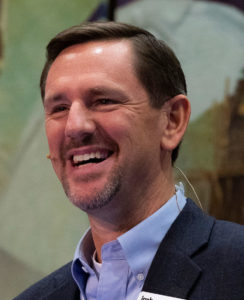Christian missionaries face a world of challenges even in “normal” times — unfriendly governments, hostile social and religious forces, cultural barriers and language struggles, to name a few.
Now, a global pandemic has made the basic acts of travel and face-to-face contact with others — essential to cross-cultural missions — difficult or impossible until further notice.
Such is the present. What’s next?
Unpleasant aspects of missions’ past might be coming back to cloud its future, at least in the minds of some young potential missionaries. Two in five young American Christians (ages 18-34) believe that “Christian mission is tainted by its association with colonialism,” according to “The Future of Missions,” a new research survey from the Barna Group in partnership with the Southern Baptist International Mission Board. One in three think that “missions work has been unethical in the past.”
That’s a warning sign for missionary support and recruitment — particularly in a time when American history is being re-evaluated in light of past racial oppression and exploitation.
The first major eras of Protestant mission expansion into Asia, Africa and Latin America paralleled the age of Western colonial dominance in the 19th and early 20th centuries. Missionaries have struggled to shake the “colonialist” charge — whether fairly or unfairly applied — ever since.
The Barna research explores that issue, along with 10 key questions about missions in the years ahead. It’s based on interviews with 1,000 young adults ages 18-34; 602 teens ages 13-17; 1,500 adults 35 and older (primarily for comparison purposes); and 504 parents of children ages 13-25.
Most of them are “engaged” Christians, meaning they not only attend church but participate in church ministry, have made a personal commitment to follow Jesus Christ and say their faith is very important to them. Many of them also believe Jesus’ “Great Commission” command in Matthew 28 (to baptize and make disciples among all peoples) applies to them.
But mission agencies no longer can count on unquestioning support even from active Christians, as IMB President Paul Chitwood admits in his preface to the study.

Paul Chitwood
“As the largest missionary-sending agency of our kind, we’re compelled to search for solutions to the challenges of a declining missionary candidate pipeline and a plateaued giving stream,” Chitwood writes. “We can no longer expect that future generations of Protestants will inherently engage in missions education and missions action. We’re obliged to ask the hard questions: How do we bridge the gap between shrinking church attendance and a burgeoning world population that doesn’t have access to the gospel?”
There’s never been a more critical time to grapple with these questions. Millennials (born 1981-1996) and Gen Z (born after 1996) now constitute the majority of the U.S. population. More than half of Americans (50.7%), or 166 million people, are under age 40, according to a Brookings Institution analysis of U.S. Census estimates released this summer. Baby Boomers no longer rule the numerical roost.
The traditional Christian commitment to evangelize competes with an increasingly secular American culture suspicious of — or openly opposed to — efforts to spread the faith at home or abroad. Eight out of 10 religiously unaffiliated American adults (the so-called “nones”) consider efforts to share faith with an aim toward converting others as “extreme.”
Seven of 10 engaged, churchgoing Christians in every age group still consider missionary work “very valuable.”
Within the U.S. church, the percentage of “engaged” Christians is shrinking by age, according to Barna: 22% among Christian Boomers, 18% among Gen-Xers (born between 1965 and 1980) and only 12% among Millennials. That threatens the overall ministry of the church, but especially missions.
“Even if every single young engaged Christian were just as supportive of international ministry as older believers, there are fewer of them to sustain missions into the future,” Barna reports. “This has profound implications not just for the spread of the good news about Christ but also for the humanitarian work carried out in his name. … With fewer and fewer Christians to support them, what will become of life-saving mission hospitals, midwife training schools and freshwater-well builders? And what if some of the Christians in the next generation aren’t convinced of the necessity of missions?”

Olah Jozsi, a Romany evangelist, and Hungarian Baptist pas- tor Csuhai Jozsi baptize Tibi and Natasha, followers of Christ who came to faith through the reach of CBF field personnel Ralph and Tammy Stocks.
The good news: Seven of 10 engaged, churchgoing Christians in every age group still consider missionary work “very valuable.” More than half of 18- to-34-year-old, engaged Christians see themselves as potential missionaries, along with four in 10 engaged teens. And three out of four engaged Christian parents are “very” or “somewhat” open to their children becoming missionaries. (That’s a huge plus; ask any missionary who has faced family opposition to their service).
Other key findings in the study:
While they see missions as important and even as their God-given personal responsibility, young engaged Christians often differ with their elders about how mission work should be conducted. “Supportive skeptics” in particular (one in four 18-to-34-year-olds) have significant reservations about missions and want to see changes. They want more focus on social-justice ministries, medical care and service to the poor. They want more empowerment of indigenous Christians to start and lead their own churches. They want missionaries to be more aware of their own biases, more affirming of indigenous languages and cultures and less “pushy” about evangelism.
“A significant minority of young engaged Christians sees missionary work as inseparable from social justice work,” says Barna. “Three in 10 (29%) say a missionary and ‘someone else who does work to fight poverty and injustice’ are very similar, compared to about one-quarter of older Christians (23%).” Their elders often see a bright line between missions and humanitarian work. Younger believers don’t.
This calls for some serious rethinking among mission groups that view humanitarian work as only a means to an end (evangelism), as a way to get residence visas for mission workers or even as a distraction from the “main thing” of disciple-making and church-starting.
Supportive skeptics are more concerned than others about the “shameful” parts of mission history. This includes association with colonial oppression, creating dependency among local believers, for example. Barna: “Many of these same engaged young believers say Christianity should rehabilitate its reputation before continuing international missions work.” Young African-American Christians, in particular, struggle with these realities, given their own awareness of historical racism.

Barbara D. Jones
However, Barbara D. Jones, who helps lead diversity efforts for Mission to the World, is optimistic about mobilizing a more diverse mission force in the years ahead.
“If they are a fellow person of color expressing reservations, I say, ‘I totally understand.’ I acknowledge that colonialism in missions is real,” Jones observes in an interview for the Barna study. “But the mission of the church remains, however imperfectly it has been implemented in the past. In my experience, many young Christians have more first-hand experience engaging other cultures; there is at least a willingness to learn. Many have not only found themselves directly engaging with various cultures; they also live in a digitally diverse space where they encounter diversity every minute. While there is always room for growth, accepting and respecting different cultures is often welcomed by this generation — which is all the more reason the church needs them to take up the mantle of missions.”
When it comes to missions-related language, engaged teens and young adults much prefer terms like “sharing faith” to traditional “Christianese” such as “witnessing,” “winning souls,” “conversion” and even “evangelize” and “missionary.” Is this a retreat from commitment to the mission task? Not necessarily. Certain religious words carry so much baggage at home and abroad these days that they can interfere with the work itself. So Christian workers avoid them.
“It’s not a matter of embarrassment or shame,” according to the study. “In some places in the world, calling oneself a missionary isn’t merely socially awkward; it’s a closed door. According to a seminary professor who trains aspiring missionaries, ‘There are places where you cannot get an entry visa to be a missionary. If you put “missionary” on your visa request, it’s denied. End of story.’”
Young engaged Christians strongly expect accountability in return for their personal and financial support, particularly in the digital age of instant communication.
Mission agencies, like all other organizations, struggle with an overall decline of trust in institutions among younger generations. Young engaged Christians strongly expect accountability in return for their personal and financial support, particularly in the digital age of instant communication. That means regular reporting on mission activities and finances, responsiveness to questions — and no closed-door meetings (euphemistically known nowadays as “executive sessions.”) Are you listening, Southern Baptist trustee boards?
Young engaged Christians open to being missionaries, like their elders, say the main reason they are willing to go is God’s personal call, but they also “want to know that their work would make a difference.” They might need patience: Mission work in challenging areas often takes generations of labor to show visible results.
The study closes with some recommendations for effectively recruiting and preparing young potential missionaries for the task. Among them: Be humble. Ask questions. Listen. Admit and deal with negative aspects of missions’ past; if necessary, repent. Teach young people to pray for missions and missionaries. Preach the whole gospel — evangelism and justice, church-starting and meeting human needs. Include everybody in the church in the discussion — all age groups, genders and ethnicities.
I’ll add one more question not in the Barna report. When many self-professed evangelicals in America support an aggressively nationalist, anti-foreign agenda and a president who wants to close the door to immigrants and refugees seeking shelter in our country, how serious are we about reaching unreached peoples in their own homelands?
My friend Lisa, a 31-year-old medical professional who has participated in mission trips and is praying about long-term service, puts it this way: “I am troubled by aspects you see in the Western church legacy. However, while we cannot change the past, we can certainly change the present. I am more concerned with what I see in the church in the West today: what I would call Americanism. Holding the values of individualism, freedom, tradition and American culture higher than the grace of Christ has grown into the church like a cancer.
“As Christians, we preach Christ crucified, we don’t preach ourselves. The love of Jesus transcends culture, tradition, ethnicity and yes, even family ties. The love of Christ has been the guiding light of my life, not tradition or culture. Only the love of Jesus has the power to change a life. So in regard to missions, we have to ask ourselves, are we showing the love of Christ, or are we showing our culture? The call to Christ is a call to serve and to live a life of surrender. We have lost the heart of Jesus in the church, and we must get back to who Jesus is to move forward.”
 Erich Bridges, a Baptist journalist for more than 40 years, retired in 2016 as global correspondent for the Southern Baptist Convention’s International Mission Board. He lives in Richmond, Va.
Erich Bridges, a Baptist journalist for more than 40 years, retired in 2016 as global correspondent for the Southern Baptist Convention’s International Mission Board. He lives in Richmond, Va.


